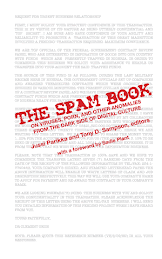During a week, two perspectives to digital economy.
1) Berlin Transmediale-festival, where I got to see and hear some of the panels in the Free Culture stream. Basically the question revolved a lot around very small scale projects and the question concerning creative as a motor for economic development. A question which touches so intimately on free labour as the actual driver for economic value - a point well elaborated by Tiziana Terranova years ago. This is where value is extracted and admittedly exploited in the age of celebrated digital culture, collaboration, participatory culture. Well, it was not all that small scale; after all, one panel featured a representative from the Benetton think tank Fabrica in Northern-Italy as well as a representative from MotorFM, among others. These are the success stories which do not even try to hide the elistist face of some of the contexts; Fabrica being a sandpit for young, successful young creators; MotorFM representative explaining how their listener basis of course depends on the accumulation of a certain brand of educated, creative and such people that often also come from wealthier backgrounds. Matteo Pasquinelli raised some nice critical points, but these could have been pursued a bit further. (I missed the Sunday's Liquid Democracies-discussion where Matteo tackled such themes in length).
2) Beyond the Soundbite-Cambridge Media Industry event on Friday and Saturday. Loads of interesting perspectives, where none really discussed the question of cultural work, labour. Whereas I enjoyed enormously some of the talks, from Alan Moore to day 2 talks on Crowdfunding and Film, I could not help noticing that celebrating collaborative and participatory culture did not in any way discuss how actual cultural work is going to be funded on a large scale. Such projects as Swarm of Angels and in a different fashion the Hunt for Gollum depend on the participation of a wide range of volunteers who based on their affective investment, the true e-factor (i.e. enthusiasm), are willing to contribute their time and skills to the project. There is nothing wrong in this, and I enjoyed the projects a lot. However, in terms of a wider cultural sustainability of such precarious jobs in arts and cultural production sector, the possibilities in using crowdsourced labour does not produce any viable income streams for the participators. This fact is taken at face value, which is scary to me, especially with the economic situation being what it is at the moment. The affective investment that has been part and parcel of film cultures from the start - fanaticism and cinephilia - turns easily into involvement in such products that revolve often around a specific genre that already attracts an enthusiastic relation to the product, or them an existing product like the Lord of the Rings-films and books on which Hunt for Gollum attaches itself. The symbiotic attachments of cultural production extend however to the parasitic attachment to the potentials of the skilled and non-skilled cultural workers whose investments might smell of "free culture" but actually "free" is only an euphemism for non-monetary investments (time, skill, energy etc.) Its far from free in those other kinds of investments.
This is where collaborative cultures and open source are the ideal models for appropriation for the capitalist logic. In short, collaborative cultures is not "free" in the sense of freedom, but free in the sense of free beer (to use the worn example turned the other way).
And yes, for a different perspective, such projects as RIP - Remix manifesto present a more politically tuned image of the powers of collaborative production. (Later, I had a chance to exchange an email with Matt Hanson (Swarm of Angels) about this where he flagged in his response that he has been developing models of meritocratic nature that also support payments for professional practice, while continuing how "something many of the less thought out, immature crowdfunding models do not take into account.") Good point, and looking forward to learning more of such developments!
Subscribe to:
Post Comments (Atom)








No comments:
Post a Comment